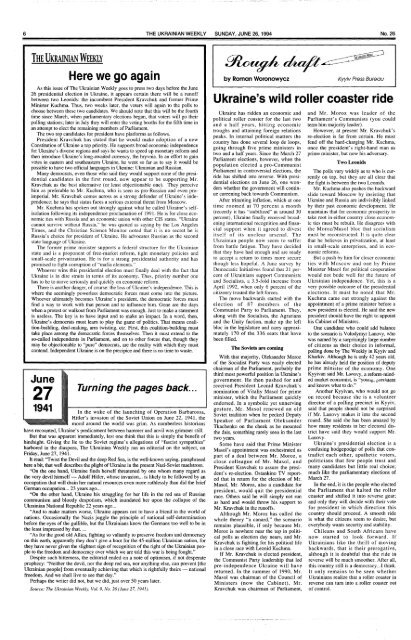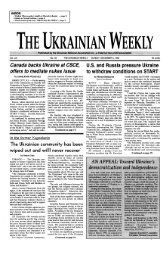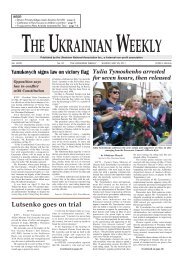The Ukrainian Weekly 1994
The Ukrainian Weekly 1994
The Ukrainian Weekly 1994
Create successful ePaper yourself
Turn your PDF publications into a flip-book with our unique Google optimized e-Paper software.
THE UKRAINIAN WEEKLY SUNDAY, JUNE 26,<strong>1994</strong> No. 26<br />
THE UKRAINIAN WEEKLY<br />
Here we go again<br />
As this issue of <strong>The</strong> <strong>Ukrainian</strong> <strong>Weekly</strong> goes to press two days before the June<br />
26 presidential election in Ukraine, it appears certain there will be a runoff<br />
between two Leonids: the incumbent President Kravchuk and former Prime<br />
Minister Kuchma. Thus, two weeks later, the voters will again to the polls to<br />
choose between these two candidates. We should note that this will be the fourth<br />
time since March, when parliamentary elections began, that voters will go their<br />
polling stations; later in July they will enter the voting booths for the fifth time in<br />
an attempt to elect the remaining members of Parliament.<br />
<strong>The</strong> two top candidates for president have platforms as follows.<br />
President Kravchuk has stated that he would make adoption of a new<br />
Constitution of Ukraine a top priority. He supports broad economic independence<br />
for Ukraine's diverse regions and says he wants to speed up monetary reform and<br />
then introduce Ukraine's long-awaited currency, the hryvnia. in an effort to gain<br />
votes in eastern and southeastern Ukraine, he went so far as to say it would be<br />
possible to have two official languages in Ukraine: <strong>Ukrainian</strong> and Russian.<br />
Many democrats, even those who said they would support none of the presi–<br />
dential candidates in the first round, now appear to be supporting Mr.<br />
Kravchuk as the best alternative (or least objectionable one). <strong>The</strong>y perceive<br />
him as preferable to Mr. Kuchma, who is seen as pro-Russian and even proimperial.<br />
Mr. Kravchuk comes across as a strong defender of Ukraine's inde–<br />
pendence; he says that status faces a serious external threat from Moscow.<br />
Mr. Kuchma has spoken out strongly against what he called Ukraine's selfisolation<br />
following its independence proclamation of 1991. He is for close eco–<br />
nomic ties with Russia and an economic union with other OS states. "Ukraine<br />
cannot survive without Russia," he was quoted as saying by the Los Angeles<br />
Times, and the Christian Science Monitor noted that it is no secret he is<br />
Russia's choice for president of Ukraine. He advocates Russian as the second<br />
state language of Ukraine.<br />
<strong>The</strong> former prime minister supports a federal structure for the <strong>Ukrainian</strong><br />
state and is a proponent of free-market reform, tight monetary policies and<br />
small-scale privatization. He is for a strong presidential authority and has<br />
promised to fight corruption of "mafia elements."<br />
Whoever wins this presidential election must finally deal with the fact that<br />
Ukraine is in dire straits in terms of its economy. Thus, priority number one<br />
has to be to move seriously and quickly on economic reform.<br />
<strong>The</strong>re is another danger, of course: the loss of Ukraine's independence. This is<br />
where the seemingly powerless democratic forces must come into the picture.<br />
Whoever ultimately becomes Ukraine's president, the democratic forces must<br />
find a way to work with that person and to influence him. Gone are the days<br />
when a protest or walkout from Parliament was enough. Just to make a statement<br />
is useless. <strong>The</strong> key is to have input and to make an impact, in a word, then,<br />
Ukraine's democrats must learn to play the game of politics. That means coali–<br />
tion-building, deal-making, arm twisting, etc. First, this coalition-building must<br />
take place among the democratic forces themselves. <strong>The</strong>n it must extend to the<br />
so-called independents in Parliament, and on to other forces that, though they<br />
may be objectionable to "pure" democrats, are the reality with which they must<br />
contend, independent Ukraine is on the precipice and there is no time to waste.<br />
in the wake of the launching of Operation Barbarossa,<br />
Hitler's invasion of the Soviet Union on June 22, 1941, the<br />
mood around the world was grim. As numberless historians<br />
have recounted, Ukraine's predicament between hammer and anvil was grimmer still.<br />
But that was apparent immediately, lest one think that this is simply the benefit of<br />
hindsight. Giving the lie to the Soviet regime's allegations of "fascist sympathies"<br />
harbored in the diaspora, <strong>The</strong> <strong>Ukrainian</strong> <strong>Weekly</strong> ran an editorial on the subject, on<br />
Friday, June 27, 1941.<br />
it read: 'Twixt the Devil and the deep Red Sea, is the well-known saying, paraphrased<br />
here a bit, that well describes the plight of Ukraine in the present Nazi-Soviet maelstrom.<br />
"On the one hand, Ukraine finds herself threatened by one whom many regard as<br />
the very devil himself— Adolf Hitler, whose invasion... is likely to be followed by an<br />
occupation that will drain her natural resources even more ruthlessly than did the brief<br />
German occupation... 23 years ago...<br />
"On the other hand, Ukraine his struggling for her life in the red sea of Russian<br />
communism and bloody despotism, which inundated her upon the collapse of the<br />
<strong>Ukrainian</strong> National Republic 22 years ago...<br />
"And to make matters worse, Ukraine appears not to have a friend in the world of<br />
nations. Occasionally the Nazis juggle the principle of national self-determination<br />
before the eyes of the gullible, but the <strong>Ukrainian</strong>s know the Germans too well to be in<br />
the least impressed by that....<br />
"As for the good old Allies, fighting so valiantly to preserve freedom and democracy<br />
on this earth, apparently they don't give a hoot for the 45-million <strong>Ukrainian</strong> nation, for<br />
they have never given the slightest sign of recognition of the right of the <strong>Ukrainian</strong> peo–<br />
ple to the freedom and democracy over which we are told this war is being fought."<br />
Despite such bitterness, the editorial ended on a note of optimism, if not desperate<br />
prophecy: "Neither the devil, nor the deep red sea, nor anything else, can prevent fthe<br />
<strong>Ukrainian</strong> peoplej from eventually achieving that which is rightfully theirs — national<br />
freedom. And we shall live to see that day."<br />
Perhaps the writer did not, but we did, just over 50 years later.<br />
Source: <strong>The</strong> <strong>Ukrainian</strong> <strong>Weekly</strong>, Yol. 9, No. 26 (June 27, 1941).<br />
2Rx)4^Jb<br />
by Roman Woronowycz<br />
clbaJst–<br />
Kyylv Press Bureau<br />
Ukraine's wild roller coaster ride<br />
Ukraine has ridden an economic and<br />
political roller coaster for the last two<br />
and a half years, hitting economic<br />
troughs and attaining foreign relations<br />
peaks, in internal political matters the<br />
country has done several loop de loops,<br />
going through five prime ministers in<br />
two and a half years. Since the March 27<br />
Parliament elections, however, when the<br />
population elected a pro-Communist<br />
Parliament in controversial elections, the<br />
ride has shifted into reverse. With presi–<br />
dential elections on June 26, one won–<br />
ders whether the government will contin–<br />
ue careening back towards Communism.<br />
After trimming inflation, which at one<br />
time zoomed at 70 percent a month<br />
(recently it has "stabilized" at around 30<br />
percent), Ukraine finally received broad–<br />
ening international recognition and finan–<br />
cial support when it agreed to divest<br />
itself of its nuclear arsenal. <strong>The</strong><br />
<strong>Ukrainian</strong> people now seem to suffer<br />
from battle fatigue. <strong>The</strong>y have decided<br />
that they have had enough and are ready<br />
to accept a return to times more secure<br />
though less hopeful. A June survey by<br />
Democratic initiatives found that 21 per–<br />
cent of <strong>Ukrainian</strong>s support Communists<br />
and Socialists, a 3.5-fold increase from<br />
April 1992, when only 6 percent of the<br />
citizenry trusted the left forces.<br />
<strong>The</strong> move backwards started with the<br />
election of 87 members of the<br />
Communist Party to Parliament. <strong>The</strong>y,<br />
along with the Socialists, the Agrarians<br />
and the Unity faction, make up the left<br />
bloc in the legislature and carry approxi–<br />
mately 170 of the 336 seats that have<br />
been filled.<br />
<strong>The</strong> Soviets are coming<br />
With that majority, Oleksander Moroz<br />
of the Socialist Party was easily elected<br />
chairman of the Parliament, probably the<br />
third most powerful position in Ukraine's<br />
government. He then pushed for and<br />
received President Leonid Kravchuk's<br />
nomination of vitaliy Masol for prime<br />
minister, which the Parliament quickly<br />
endorsed, in a symbolic yet unnerving<br />
gesture, Mr. Masol renewed an old<br />
Soviet tradition when he pecked Deputy<br />
Speaker of Parliament Oleksander<br />
Tkachenko on the cheek as he mounted<br />
the dais, something rarely seen in the last<br />
two years.<br />
Some have said that Prime Minister<br />
Masol's appointment was orchestrated as<br />
part of a deal between Mr. Moroz, a<br />
close colleague of Mr. Masol, and<br />
President Kravchuk to assure the presi–<br />
dent's re-election. Ostankino ТУ report–<br />
ed that in return for the election of Mr.<br />
Masol, Mr. Moroz, also a candidate for<br />
president, would quit the presidential<br />
race. Others said he will simply not run<br />
as hard and would throw his support to<br />
Mr. Kravchuk in the runoffs.<br />
Although Mr. Moroz has called the<br />
whole theory "a canard," the scenario<br />
remains plausible, if only because Mr.<br />
Moroz is nowhere near the top in politi–<br />
cal polls as election day nears, and Mr.<br />
Kravchuk is fighting for his political life<br />
in a close race with Leonid Kuchma.<br />
if Mr. Kravchuk is elected president,<br />
the Communist Party leadership that led<br />
pre-independence Ukraine will have<br />
returned, in the summer of 1990, Mr.<br />
Masol was chairman of the Council of<br />
Ministers (now the Cabinet), Mr.<br />
Kravchuk was chairman of Parliament,<br />
and Mr. Moroz was leader of the<br />
Parliament's Communists (you could<br />
term him majority leader).<br />
However, at present Mr. Kravchuk's<br />
re-election is far from certain. He must<br />
fend off the hard-charging Mr. Kuchma,<br />
once the president's right-hand man as<br />
prime minister, but now his adversary.<br />
Two Leonids<br />
<strong>The</strong> polls vary widely as to who is cur–<br />
rently on top, but they are all clear that<br />
the fight is between the two Leonids.<br />
Mr. Kuchma also pushes the backward<br />
slide toward Moscow by insisting that<br />
Ukraine and Russia are indivisibly linked<br />
by their past economic development. He<br />
maintains that for economic prosperity to<br />
take root in either country close econom–<br />
ic ties must be rebuilt. He disagrees with<br />
the Moroz7Masol bloc that socialism<br />
must be reconstructed, it is quite clear<br />
that he believes in privatization, at least<br />
in small-scale enterprises, and in eco–<br />
nomic reforms.<br />
But a push by him for closer economic<br />
ties with Moscow and one by Prime<br />
Minister Masol for political cooperation<br />
would not bode well for the future of<br />
<strong>Ukrainian</strong> independence. Yet, this is a<br />
very possible outcome of the presidential<br />
elections, it must be noted that Mr.<br />
Kuchma came out strongly against the<br />
appointment of a prime minister before a<br />
new president is elected. He said the new<br />
president should have the right to appoint<br />
his Cabinet of Ministers.<br />
One candidate who could add balance<br />
to the scenario is volodymyr Lanovy, who<br />
was named by a surprisingly large number<br />
of citizens as their choice in informal,<br />
polling done by <strong>The</strong> <strong>Weekly</strong> in Kyyiv and<br />
Kharkiv. Although he is only 42 years old,<br />
he has already held the position of deputy<br />
prime minister of the economy. One<br />
Kyyivan said Mr. Lanovy, a reform-mind–<br />
ed market economist, is "young, persistent<br />
and knows what to do."<br />
Another Kyyivan, who would not go<br />
on record because she is a volunteer<br />
director of a polling precinct in Kyyiv,<br />
said that people should not be surprised<br />
if Mr. Lanovy makes it into the second<br />
round. She said she has been amazed by<br />
how many residents in her electoral dis–<br />
trict have said they would support Mr.<br />
Lanovy.<br />
Ukraine's presidential election is a<br />
confusing hodgepodge of polls that con–<br />
tradict each other, apathetic voters,<br />
politicians that few people trust and<br />
many candidates but little real choice;<br />
much like the parliamentary elections of<br />
March 27.<br />
in the end, it is the people who elected<br />
the Parliament that halted the roller<br />
coaster and shifted it into reverse gear;<br />
and only they will decide with their vote<br />
for president in which direction this<br />
country should proceed. A smooth ride<br />
is what the citizens seem to desire, but<br />
everybody wants security and stability.<br />
Chileans and South Africans have<br />
now started to look forward, if<br />
<strong>Ukrainian</strong>s like the thrill of moving<br />
backwards, that is their prerogative,<br />
although it is doubtful that the ride in<br />
reverse will be much smoother. After all,<br />
this country still is a democracy...І think,<br />
it only remains to be seen whether<br />
<strong>Ukrainian</strong>s realize that a roller coaster in<br />
reverse can turn into a roller coaster out<br />
of control.

















